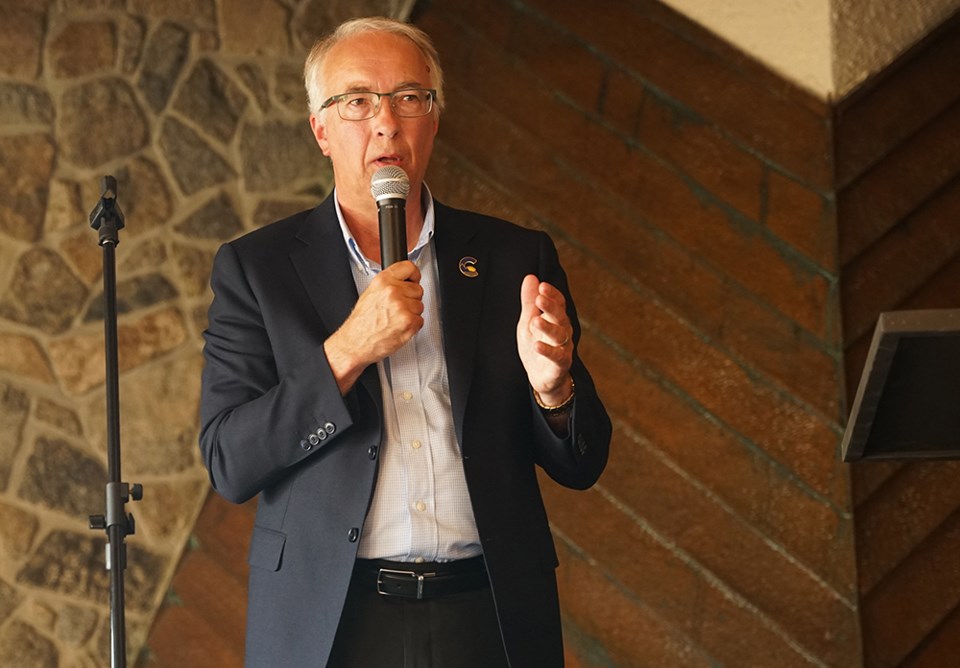Conservative Party of British Columbia leader John Rustad articulated his vision for the province during a visit to the qathet region in advance of the writ dropping for the October 19 provincial election.
Speaking to a full audience at Beach Gardens Resort and Marina in Powell River, Rustad covered issues such as eliminating the carbon tax, improving housing affordability, economic reconciliation with First Nations and addressing addiction through recovery programs.
Rustad said life in BC has become challenging because the governing NDP has made it difficult for people to live in this province.
“One-third of British Columbians are thinking about leaving this province,” said Rustad. “Worse, one in two youth are thinking about leaving this province. People are leaving because they have lost hope. Who can blame them?”
Rustad said the province has a huge problem with crime and with drugs. He added that there is a huge problem with the health-care system. Even the education system is in decline and the resource sector is in a “disastrous state,” according to the leader.
“So how do we fix these things? We just must get back to basics. We’re going to do that.”
A first step, according to Rustad, is his party’s pledge to get rid of the carbon tax.
“It’s $3.5 billion from people’s lives and the government is just taking it, using it for a slush fund for projects,” said Rustad. “Let’s get that back into people’s pockets.”
Rustad said when it comes to food, the province produces only 34 per cent of the food that is consumed here.
“Two-thirds of the food we need comes from outside our borders,” said Rustad. “That leaves us vulnerable. We need to double food production in this province.”
When it comes to housing, Rustad said there is so much that needs to be done.
“We have a government today that is pointing at everybody but themselves,” said Rustad. “Government has made it too difficult to be able to build housing in this province. I want to be able to make sure people can have an affordable place to live.
“We’re going to make sure we get out of the way. We’re going to clean up the bureaucracy and the delays. We’re going to clean up the building code. We’re going to make sure we can get housing built in this province, just like it has been in the past.”
Rustad said there are problems in the resource sector. He said Canfor had just announced the permanent closure of a mill in Fort St. John.
“Analysts are saying that our forest assets in BC are being valued at zero,” said Rustad. “Remember, this used to be the backbone of British Columbia. First, we are going to go to a single project, single permit. We’re going to get rid of all the layers of bureaucracy and get back to delivering on services for people so they can get to work.”
In mining, Rustad said there are 17 mines permitted or about to be permitted, representing a $38 billion investment, which could create 20,000 to 30,000 jobs, with average wages and benefits of $138,000 a year. He said the mines will add more than $800 billion to BC’s economy over the life of those mines.
“We’ve just got to get government out of the way,” said Rustad.
On the economic front, Rustad said the $8 billion deficit needs to be brought down, which he termed as unsustainable.
“More importantly, we need to be able to invest in health care and in education,” said Rustad. “We need to be able to invest in dealing with addictions and crime, and we can’t tax people any further. As a matter of fact, we need to be able to figure out how to reduce people’s taxes.
“Just last weekend, we had five different communities with emergency rooms closed. Wait times are frequently between 10 and 12 hours. A million people in this province don’t have family doctors. The system has failed and you can’t just throw more money at it and expect a different result. We need to look at models that work much better. We’re looking at European models that are universal health care, like us. We want the funding to be focussed on the patient.
“There’s lots we need to do in training nurses, as well as doctors and other health-care professionals, and especially for underserviced communities. We want to make sure that we put in enough incentive to be able to get doctors and other health-care professionals to serve in communities that desperately need it.”
Regarding the opioid crisis, Rustad said if the Conservatives were to form government, they would bring an end to safe supply and decriminalization. He was critical of provincial health officer Bonnie Henry’s stance on drugs and said she would not have a position with a Conservative government. Rustad said his government would have a strict policy of getting people into recovery.
In terms of local issues, during question period after Rustad’s speech, he was asked about a potential name change for the city, supportive housing, and moving the Westview/Little River ferry base to Powell River.
Regarding the ferry, Rustad said he was more than happy to look at having the ferry located here.
On the name change matter, Rustad said there must be a referendum.
Rustad said regarding supportive housing, in Victoria, a project was built in a neighbourhood that has children. He said the facility has special rooms for consuming drugs.
“My perspective on supportive housing, or housing for hard-to-house people, is if there are no services, you cannot do that within a community,” said Rustad. “They [residents] are going to carry out their lifestyles. You get dealers that come in as part of it. This is happening in too many places.”
When asked if a Conservative government would make hardcore drugs illegal again, Rustad responded affirmatively.
Join the Peak's email list for the top headlines right in your inbox Monday to Friday.




